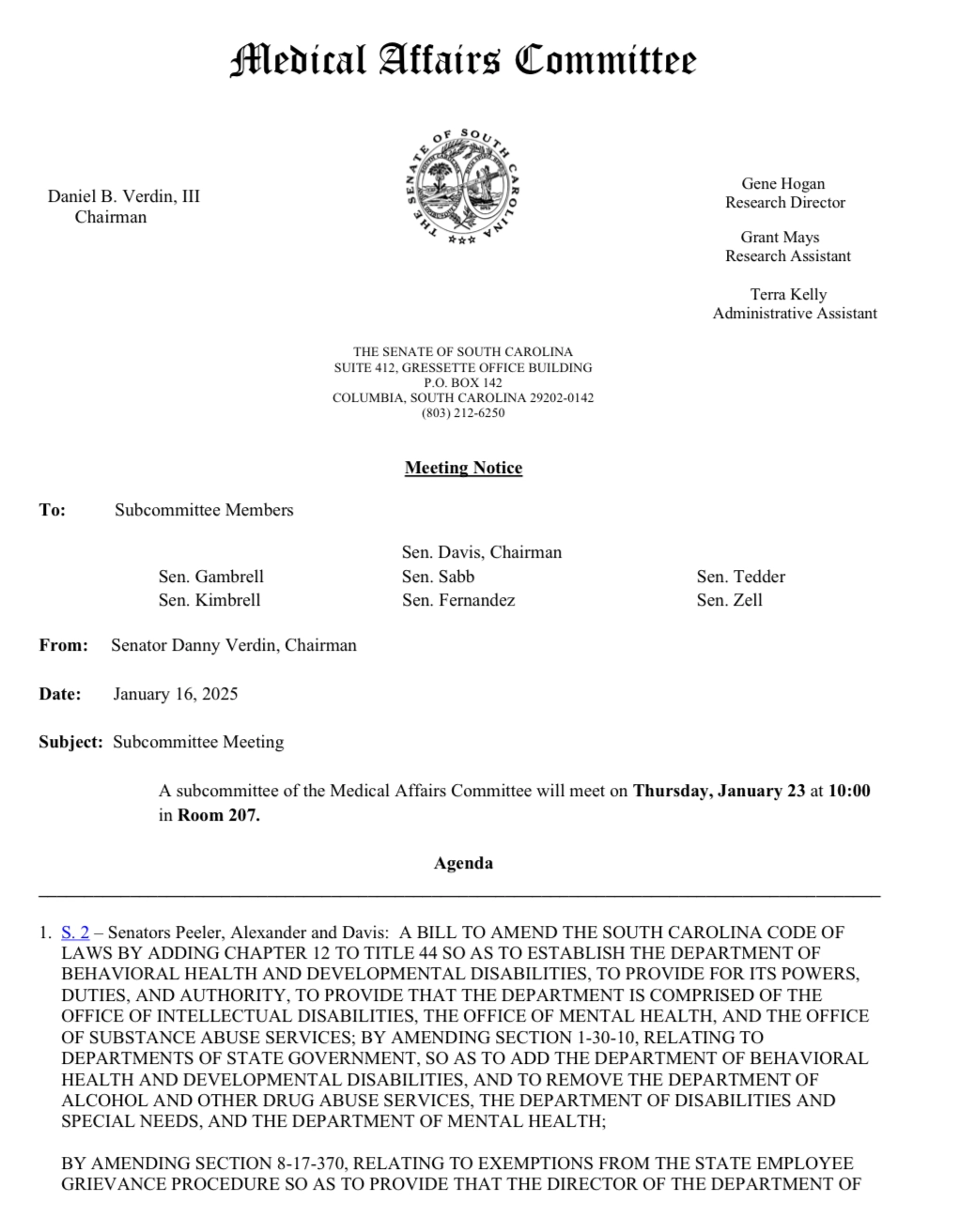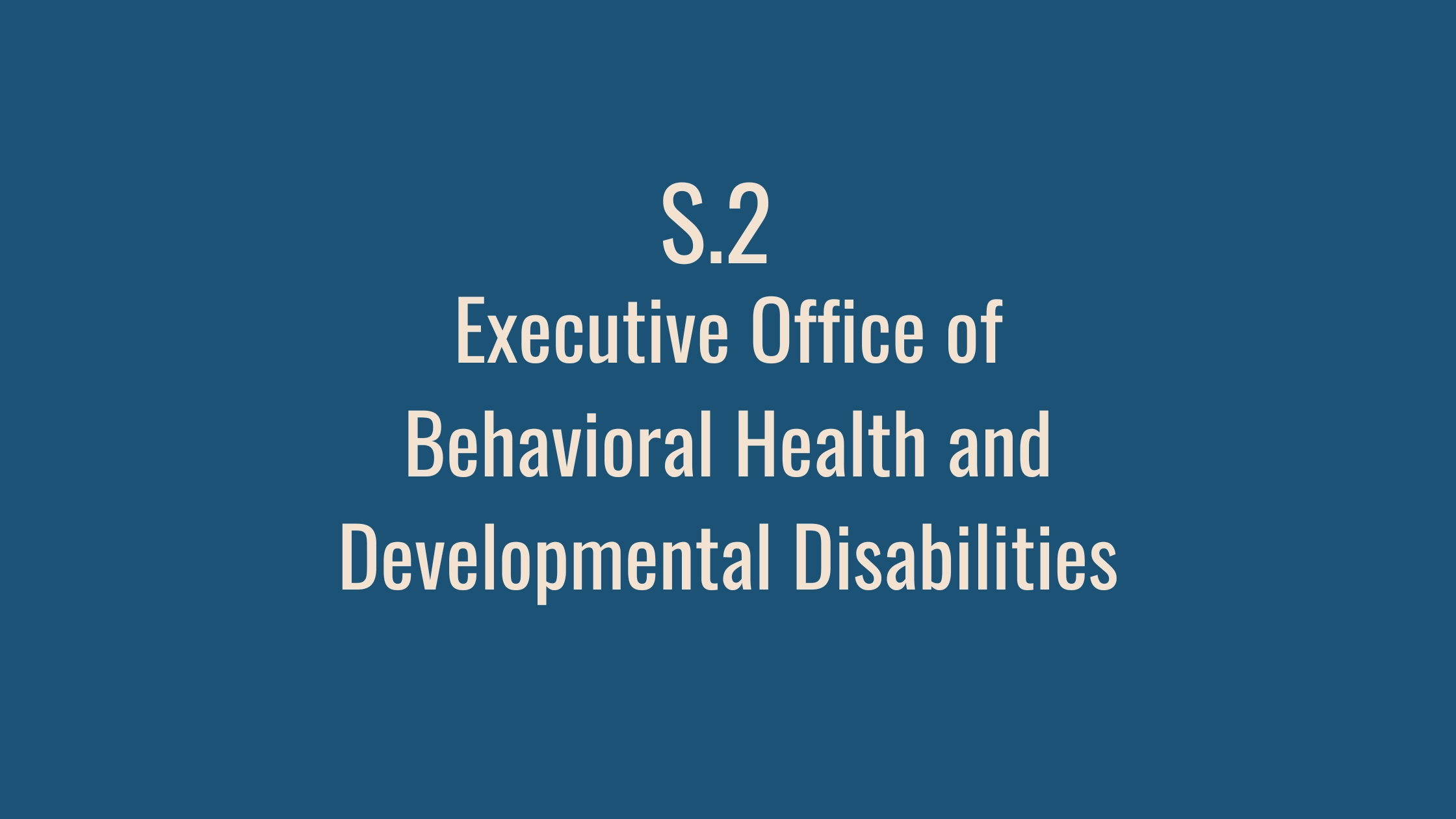Bill Name: S.2 – Executive Office of Behavioral Health and Developmental Disabilities
Legislative Sponsor(s): Senators Peeler, Alexander, and Davis
On the schedule to be heard on 1/23 in the Senate Medical Affairs Committee

Summary of the Bill
On the surface, S.2 looks like a simple restructuring bill, combining the Department of Mental Health, the Department of Disabilities and Special Needs, and the Department of Alcohol and Other Drug Abuse Services into one massive agency—the Department of Behavioral Health and Developmental Disabilities (DBHDD).
Sounds efficient, right? It’s not.
It’s more centralization.
What is it with our General Assembly’s obsession with centralization? They keep creating massive state agencies, selling them as efficiency upgrades when all they really do is pile on more bureaucracy and push decisions further from the people. Not only that—why do we even need these agencies in the first place? Government has repeatedly failed at managing healthcare, yet they keep expanding its reach.
And these agencies don’t even deal with the same issues. If efficiency were really the goal, wouldn’t it make more sense to reduce their size and cut government involvement in healthcare altogether? Instead, they double down on a system that has never worked.
Another contradiction to the so-called “efficiency” of this effort is that consolidating agencies costs a lot of money—which is probably why we haven’t seen the fiscal impact yet.
Just like the 2025 Health Czar bill version (H.3613), this bill hands the Governor sole power to appoint the department’s director, puts critical behavioral health decisions under one political appointee, and expands public health emergency powers in ways that should concern everyone.
ANOTHER RED FLAG 🚩
S.2 is a messy bill, and that’s a major red flag. If its stated purpose is to consolidate three agencies, then why does it contain sections that have nothing to do with that goal? When a bill is packed with unrelated provisions, it usually means one of two things:
1. Lawmakers could be using S.2 as a vehicle to slip in other policies that wouldn’t pass on their own. By burying unrelated provisions inside a “consolidation” bill, they make it harder for people to notice or challenge them.
2. It’s Sloppily Written to Rush It Through
It also quietly slips in changes to quarantine laws, vaccine definitions, pharmacy rules, and emergency mandates—none of which have anything to do with centralizing a mental health department.
The Real Problem
S.2 sets the stage for H.3613, the even bigger “Health Czar” bill that would consolidate nearly every health-related agency in South Carolina. S.2 gets people cozy with centralization so H.3613 can finish the job.
Key Sections That Should Have You Concerned
SECTION 2 – Governor’s Sole Authority to Appoint the DBHDD Director
Gives the Governor full control over appointing the agency’s director. Why are we handing the governor this much power—does he even understand these healthcare issues?
No legislative oversight, no checks and balances.
One politically appointed person will control all mental health, disability, and substance abuse services.
Why does this matter?
If the governor gets to handpick this director with no real qualifications, what’s stopping this from turning into a political machine that controls healthcare decisions for the entire state?
SECTION 15 – Modifies Governor’s Emergency Powers
Wait—why is this in a behavioral health bill?
This section tweaks the Governor’s authority to declare and lift states of emergency.
SECTION 17 – Alters Pharmacy Regulations
Hold up. Why are we modifying pharmacy rules in a bill about mental health and disabilities?
SECTION 19 – Redefining Public Health Emergencies to Include Permanent Disability
THIS DOES NOT BELONG IN THIS BILL!
So now a public health emergency isn’t just about pandemics, bioterrorism, or highly contagious outbreaks—it can include permanent long-term disability.
Why is this a problem?
Now, they could be used indefinitely for chronic conditions.
This could justify extended government control over healthcare decisions, restrictions, and mandates.
The vague language makes it easier to keep emergency powers in place longer than necessary.
SECTION 20 – Expanded Government Control Over Quarantine and Isolation
WHY is a mental health bill expanding quarantine and forced examination rules?
This section strengthens state control over quarantine and medical testing.
THIS DOES NOT BELONG IN THIS BILL!
Yikes to some of these changes!
Expands authority over symptomatic and exposed individuals
SECTION 44-1-140 states: "Any symptomatic person or person who has been exposed to the contagious disease for which the public health emergency has been declared whose refusal of physical examination or testing results in uncertainty regarding whether he or she has been exposed or is infected may be subject to quarantine."
Allows indefinite quarantine until the incubation period ends
"An exposed person should not be released from quarantine due to a normal physical examination or test result but should remain in quarantine until the end of the incubation period."
Grants authority to force isolation for refusal of testing
"Once a person develops symptoms in quarantine, they must be removed to isolation. If they refuse testing or examination, the isolation period may be affected."
Informed Consent Forms: A Hidden Risk
SECTION 21 - Add as subsection (E) to Section 44-4-520 of the South Carolina Code. This subsection outlines the requirements for obtaining informed consent.
THIS DOES NOT BELONG IN THIS BILL!
But, watch out for what you sign.
Signing an informed consent form could be used against you.
Many forms include legal language that shifts responsibility to the patient—even if you’re coerced into signing.
These forms could allow your vaccination or medical treatment status to be shared with employers, schools, or government agencies.
Also, who decides what vaccine risks are disclosed—the CDC?
Setting the Stage for H.3613
This bill doesn’t exist in a vacuum. It lays the groundwork for H.3613, the larger health centralization bill that would consolidate even more agencies into a Governor-controlled mega health department.
If S.2 passes, it’ll be much harder to stop H.3613 because the groundwork will already be in place.
Bottom Line: This Is a Hard No.
S.2 is a complete mess of a bill with a lot of concerning language. Plus, there are a lot of sections in this bill that have nothing to do with behavioral health. If the goal is to improve healthcare quality in South Carolina, this is NOT how you do it. Instead, decentralize, reduce government interference in healthcare, and allow the free market to thrive—without competition from massive government health agencies and monopolistic hospital systems.
Recommendation: STRONGLY OPPOSE
Centralization contradicts the principles of limited government.
South Carolinians need to push back—before this power grab becomes permanent.
Disclaimer: The views expressed in this article are those of the author and do not constitute legal or professional advice. ConservaTruth assumes no liability for any actions taken based on this content. Read more.

Subscribe to ConservaTruth's Email Newsletter for curated insights on South Carolina's legislative activities and conservative viewpoints, delivered straight to your inbox! With vetted and easy-to-understand information, our newsletter empowers you to become an informed and engaged citizen, actively participating in safeguarding our cherished Constitutional values. Don’t miss out on crucial updates—join our community of informed conservatives today!





Comments